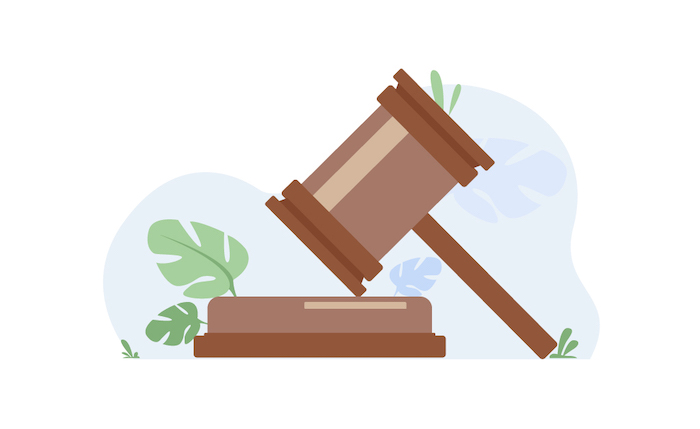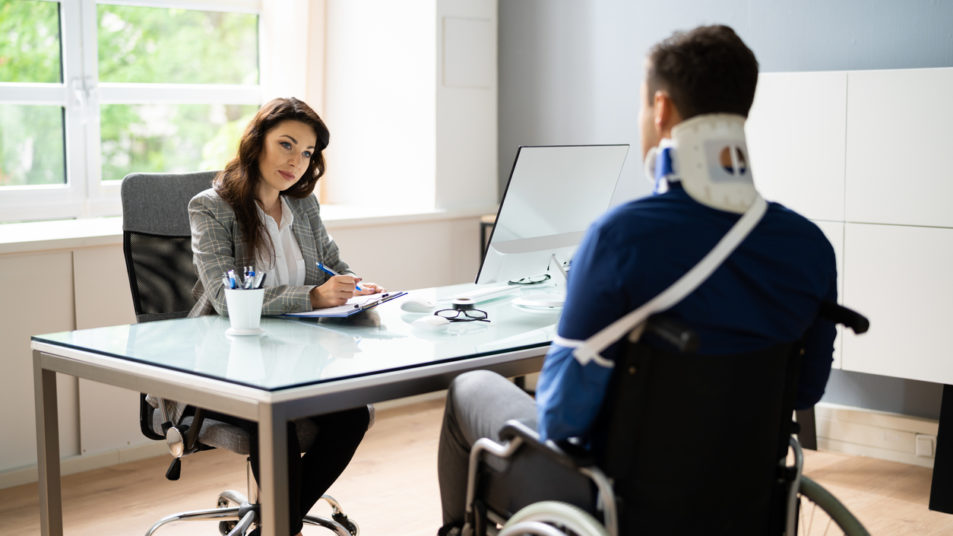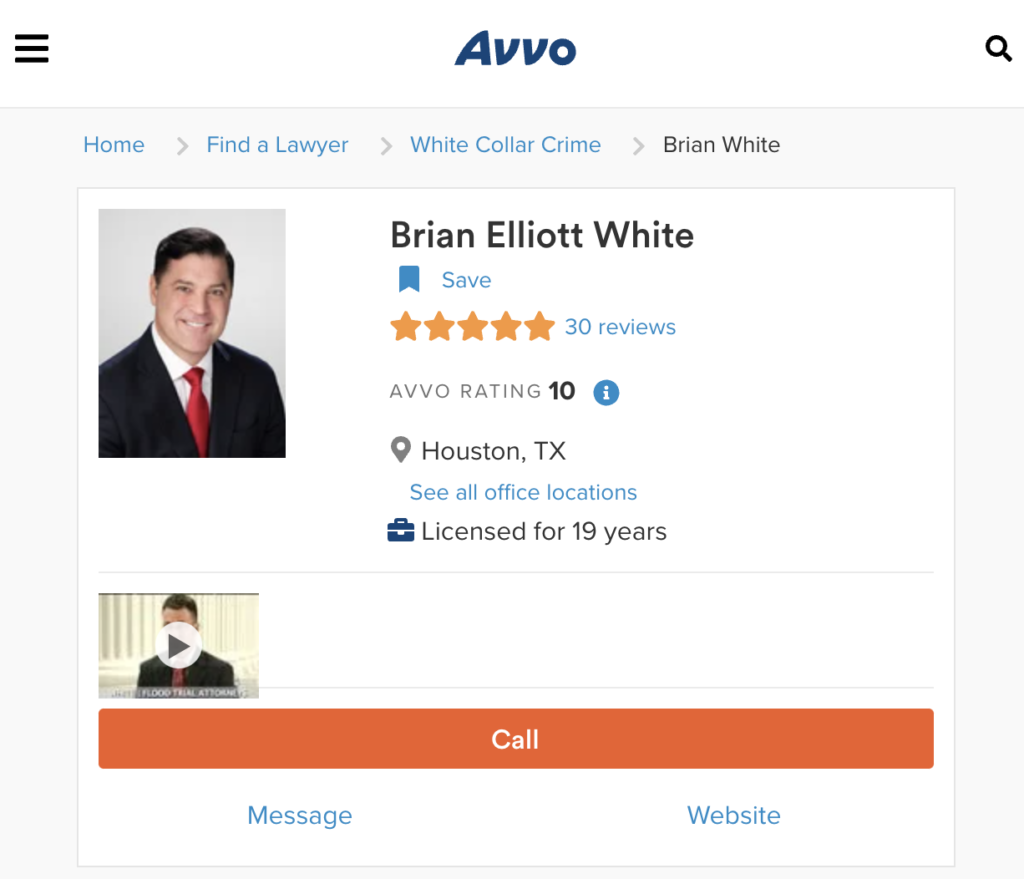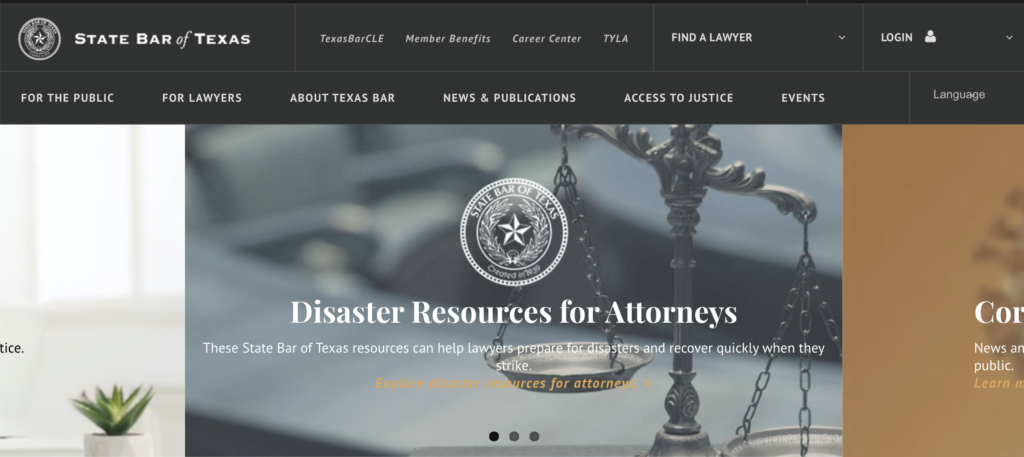25 Tips for Getting a Fair Personal Injury Settlement
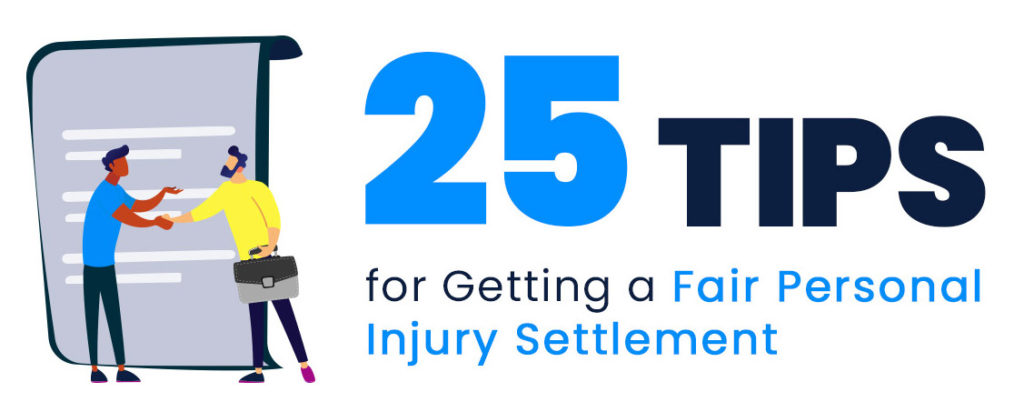
Have you been hurt in an accident? If so, there’s a good chance that you’ll have to deal with an insurance company as you seek compensation. Whether you’re seeking benefits from your provider or the at-fault party’s insurer, the company and its defense attorneys won’t be eager to cut you a check.
They’ll try to either deny your claim or drive down its value.
So, how can you know that you’re really getting a fair settlement deal?
Below, personal injury lawyers from across the country have provided their top tips for making sure that victims like you get a fair deal during negotiations. Check them out and keep them in mind if you’re in an accident.
25 Tips You Can Use to Get the Best Settlement for Your Personal Injury Claim
Personal injury claims cover car accidents, premises liability claims, defective product injuries, and many other types of accidents and injuries. Before you accept any insurance settlement or personal injury settlement, read these 25 tips for getting a fair personal injury settlement.

Tip 1 From A Las Vegas Attorney
Justin Watkins – Las Vegas Personal Injury Lawyer
Report the accident as soon as possible. Documenting the accident in writing is crucial when pursuing a personal injury claim. Attorney Justin Watkins explains that without a written record, the other party may deny any involvement, and the insurance company might not handle the claim with the same level of seriousness due to a lack of evidence.

Tip 2 From A Dallas Attorney
Mark Anderson – Dallas Personal Injury Lawyer
Anderson Injury Lawyers
Always be honest with the police. When reporting an accident or injury, stick to the facts and avoid exaggerations or unnecessary details. Providing more information than needed or bending the truth can backfire, leading to serious consequences and potentially jeopardizing your chances of a successful personal injury lawsuit. Keep it clear, concise, and truthful when filing a police report.

Tip 3 From A Chicago Attorney
Adam Zayed – Chicago Personal Injury Lawyer
Zayed Law Offices Personal Injury Attorneys
Capture the scene while you can. If possible, take photos and record a video of the accident site exactly as it is. Preserving this evidence is key. Attorney Adam Zayed emphasized that without proof, it may be harder to prove what really happened. For instance, if you slip and fall, the property owner might remove the hazard and later claim you were at fault.
Additionally, try to gather contact information from eyewitnesses. Their testimony can be a powerful asset in your case, helping to back up your side of the story. The more evidence you collect, the stronger your personal injury claim will be.

Tip 4 From A Tampa Attorney
Bill Winters – Tampa Personal Injury Lawyer
Winters & Yonker Personal Injury Lawyers
Seek prompt medical attention for your injuries. Seeing a physician right after an accident or injury is always wise. Even if you feel fine, you might have injuries that aren’t immediately apparent.
If you don’t go to the emergency room from the accident scene, don’t say that you are fine or you are not injured. Instead, merely say that you intend to see your doctor about your injuries.
Delays in medical care could hurt your case. The insurance company may use a delay in seeing a doctor to argue that the accident did not cause your injury.

Tip 5 From An Ocala Attorney
Bill Allen – Ocala Personal Injury Lawyer
Report all symptoms to your physicians immediately. Regardless of how you feel or how minor you might believe a symptom is, report all symptoms to your doctors immediately. You could have sustained a severe injury, and the doctor needs to follow up.
Also, your symptoms are noted in your medical records. If your symptoms worsen, there is a record of when the symptoms began after the accident. That information can help fight against claims that the accident did not cause your injuries.

Tip 6 From A Fort Worth Attorney
Jason Stephens – Fort Worth Personal Injury Lawyer
Stephens Law | Personal Injury Wrongful Death Trial Lawyer
Follow your doctor’s treatment plan. Don’t stop your doctor’s treatment plan. If you don’t follow up with your doctor and complete treatment, the insurance company may allege that you failed to mitigate your damages. You would not be entitled to compensation for injuries and damages that could have been avoided had you followed your doctor’s orders.

Tip 7 From A Houston Injury Lawyer
Ryan Zehl – Houston Personal Injury Lawyer
Zehl & Associates Injury & Accident Lawyers
Seek immediate medical attention for your injuries. You should seek immediate medical attention after an accident or injury — even if you think you are uninjured. You might have injuries with delayed symptoms; some injuries don’t present symptoms until hours or days after an accident.
Seeking prompt medical attention ensures you receive diagnosis and treatment for all of your injuries. It also provides you with medical evidence connecting the accident to your injuries, as well as proof of your medical expenses after the incident. This evidence will be crucial for your personal injury claim.

Tip 8 From A Miami Attorney
Sagi Shaked – Miami Personal Injury Lawyer
Shaked Law Personal Injury Lawyers
Don’t agree to a recorded or written statement without a lawyer. Claims adjusters may tell you that you need to provide a written or recorded statement to process your claim. Providing a statement is generally not in your best interest. Claims adjusters are trained to ask leading questions that elicit responses that can be intentionally misinterpreted.
Anything you say could be used in court. Therefore, it is best to seek legal counsel before giving any statements about the accident or your injury.

Tip 9 From A Baltimore Attorney
Jill Kolodner – Baltimore Personal Injury Lawyer
William G. Kolodner Personal Injury Lawyers
Never admit fault for the cause of the accident or injury. Don’t apologize, say you are sorry, or indicate that you believe you could be to blame for the accident.
Under comparative negligence and contributory fault laws, your compensation could be significantly reduced if you are partially to blame for the cause of your injury.

Tip 10 From A Philadelphia Attorney
Todd Lasky – Philadelphia Personal Injury Attorney
Zavodnick & Lasky Personal Injury Lawyers
Don’t discuss the accident or your injuries with other people. If you discuss the accident with another person, they could be called as a witness at your trial. It is best not to discuss your accident or injuries with anyone other than your physicians and lawyer. Keep in mind: a spouse cannot be forced to testify against the other spouse.

Tip 11 From A Portland Attorney
Aaron Tillmann – Portland Personal Injury Lawyer
Tillmann Law Personal Injury Lawyers
Stay off social media while your case is active. Posting online, even with the highest privacy settings, can put your claim at risk and affect how much your personal injury case is worth. What you share isn’t truly private, and defense attorneys may be able to access your posts, looking for anything they can use against you.
There have even been cases where judges allowed them to dig through a victim’s social media accounts. To protect your accident case and ensure the best chance at a fair settlement, it’s safest to stay silent online until everything is resolved.

Tip 12 From A Kansas Attorney
Chelsea Dickerson – Personal Injury Lawyer In Kansas City
Dickerson Oxton, LLC
Wait for a complete investigation. Either you or an attorney needs to conduct a thorough investigation to determine how you were injured, who is responsible, and what evidence is available. There could be more than one party responsible for your injuries. It is crucial to identify each liable party to maximize compensation.

Tip 13 From An Oklahoma Attorney
Chris Hammons – Personal Injury Lawyer in Oklahoma City
Laird Hammons Laird Personal Injury Lawyers
Document your recovery with photos and a journal. You are entitled to non-economic damages as part of your injury claim. However, these damages are not proven through medical records or bills. Instead, you need a detailed narrative about how your injuries impacted your daily life.
Taking pictures of your injuries as you heal gives the insurance company evidence of how long it took for you to recover. Keeping a pain and suffering journal detailing your recovery provides information about how your injuries negatively impacted your daily life and enjoyment of life.

Tip 14 From A Houston Attorney
Brian White – Houston Personal Injury Lawyer
Attorney Brian White Personal Injury Lawyers
Don’t accept a settlement offer or sign documents without talking to a lawyer. If you sign a settlement agreement, your case will be over. The insurance company inserts language in the agreement that releases ALL parties from ALL future claims. You cannot try to collect more money in the future, even if you discover more damages or other injuries. So, while accepting a settlement check right away might make life easier now, it could ultimately do more harm than good. Discuss settlement options with your lawyer or, better yet, have your attorney handle negotiations on your behalf.

Tip 15 From A Clearwater and St. Petersburg Attorney
Mark H. Perenich – Clearwater and St. Petersburg Personal Injury Lawyers
Perenich, Caulfield, Avril & Noyes Personal Injury Lawyers
Never release your medical records to an insurance company. You may be asked for your medical records or to sign a release for medical records. Don’t! The insurance company is searching for pre-existing conditions and prior injuries.
The company will try to blame your current injuries on pre-existing conditions to avoid paying the claim. Don’t hide or lie about a prior injury or pre-existing condition. Let your attorney handle disclosing that information.

Tip 16 From A New York City Attorney
Craig D. Rosenbaum – New York City Personal Injury Lawyer
Don’t plead guilty to a traffic offense without legal counsel. Pleading guilty to a traffic ticket could make it easier for the other party to avoid liability and even point the finger at you. Establishing that you’ve violated a safety law could give them grounds to base a claim on negligence per se. That would effectively pave the way for them to hold you accountable for their injuries. But, don’t ignore the ticket. Instead, seek legal advice to help you decide what you should do about the traffic ticket.

Tip 17 From A San Diego Attorney
David J. Muñoz – San Diego Personal Injury Lawyer
Mission Legal Center
Document damages and financial losses with records. To recover compensation for damages, you must document the damages with direct evidence.
Evidence may include:
- Copies of medical records
- Medical bills and invoices
- Receipts for payment of out-of-pocket expenses
- Statements from your employer
- Copies of tax returns and pay stubs
- Invoices, bills, and receipts for payment
The more evidence you have of your damages, the greater chance you receive maximum compensation for your injury claim.

Tip 18 From An Orlando Attorney
Nicholas Norden – Orlando Personal Injury Lawyer
Norden Leacox Accident & Injury Law
Review your insurance policy carefully. Attorney Nicholas Norden recommends getting informed and understanding the types of coverage you have and the limits for each. You may be eligible to recover compensation for certain damages through your own policy. If your coverage isn’t enough to fully cover your losses, you should explore the option of filing a claim or lawsuit against the responsible party.

Tip 19 From A Harrisburg Attorney
Christopher J. Marzzacco – Harrisburg Personal Injury Lawyer
Marzzacco Niven & Associates Injury Law
Never settle an injury claim while receiving medical treatment. You need to complete your medical treatment before settling your case. Until you complete your treatment and your doctor releases you, there is no way to know if you sustained a permanent impairment or disability, which could increase the value of your damages.

Tip 20 From A San Diego Attorney
Michael Pines – San Diego Personal Injury Lawyer
Pines Salomon Personal Injury Lawyers
Don’t miss the deadline to file a lawsuit. Every state has a statute of limitations that sets a time limit for filing personal injury claims—but that deadline can vary depending on the type of case, such as medical malpractice, wrongful death, or product liability.
To protect your right to compensation, consult with an experienced personal injury attorney such as Michale Pines as soon as possible. If you miss the deadline, the at-fault party and their insurance company are off the hook—you won’t be able to recover any damages. Don’t let time run out on your case!

Tip 21 From An Atlanta Attorney
Robert Hammers – Atlanta Personal Injury Lawyer
Hammers Car Accident & Personal Injury Lawyers
Don’t forget future damages. If you sustain a disability or impairment, you could require ongoing personal and medical care. As a result, you may not be able to work, or your earning potential could be diminished.
These damages may be included in your settlement demand. You may need to consult with medical experts and financial professionals to calculate the correct value of future damages.

Tip 22 From A Denver Attorney
Kurt Zaner – Denver Personal Injury Lawyer
Zaner Law Personal Injury Lawyers
Don’t accept the first offer from the insurance company. You are not required to accept a settlement offer from an insurance company, regardless of what the claims adjuster states. You have the right to counteroffer and negotiate a fair settlement. If the insurance company refuses to negotiate in good faith, you may want to proceed with a personal injury lawsuit.

Tip 23 From A Lexington Attorney
Matthew C. Minner – Lexington Personal Injury Lawyer
Minner Vines Moncus Injury Lawyers
Ask for justifications for low settlement offers. Ask the claims adjuster to provide a written statement explaining the reasons for the settlement amount. Then, reply to each reason with an argument why the amount should be higher.

Tip 24 From A Fort Walton Beach Attorney
Paul Brannon – Fort Walton Beach Personal Injury Lawyer
Brannon & Brannon
Emphasize pain and suffering damages. You are entitled to compensation for the pain and suffering experienced because of the accident.
Pain and suffering damages include:
- Physical discomfort
- Disabilities and impairments
- Emotional distress
- Scarring and disfigurement
- Mental trauma
- Loss of enjoyment of life
- Reduced quality of life
Your pain and suffering damages could be worth between 1.5 to 5 times the amount of your economic damages.

Tip 25 From A Tampa Attorney
Mark Roman – Experienced Car Accident Lawyer in Tampa, FL
Roman Austin Personal Injury Lawyers
Don’t give in to pressure. Don’t allow the insurance company or another party to pressure you into accepting a settlement offer. If you are unsure about a settlement offer, seek legal counsel. You have the right to talk with a lawyer before accepting an offer to settle a personal injury case like a car accident.
One Last Tip – Know When to Hire a Personal Injury Lawyer
Some individuals can settle a personal injury claim without a lawyer. However, it is wise to talk with a lawyer, even if you don’t hire an attorney.
Knowing when to hire a personal injury attorney to handle your case is essential. There are things that you may not be able to do to investigate your claim. If you have any doubts about the value of your damages, the damages you can recover, deadlines, fault, or liability, think about reaching out to a personal injury lawyer for help.







